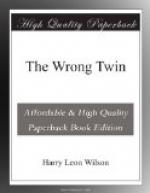To no one that day, except to Wilbur Cowan himself, had it occurred that Merle Whipple’s birthday would also be the birthday of his twin brother.
* * * * *
Winona hoped that some trace of the day’s new elegance would survive into Wilbur’s professional life, but in this she suffered disappointment. He refused to wear, save on state occasions, any of the beautiful new garments, and again went forth in the cap and dingy sneakers, the trousers without character, and the indeterminate sweater which would persist in looking soiled even after relentless washing.
Not even for golf with Patricia Whipple would he sound a higher note in apparel. Patricia came to the course, accompanied by the dark girl, who said she was mad about golf, and over the eighteen holes each strove for his exclusive attention. They bored him vastly. He became mad about golf himself, because they talked noisily of other subjects and forgot his directions, especially the dark girl, who was mad about a great many things. She proved to be a trial. She was still so hopeless at the sport that at each shot she had to have her hands placed for her in the correct grip. The other two were glad when she was called home, so that Patricia could enjoy the undivided attention of the coach. The coach was glad, but only because his boredom was diminished by half; and Patricia, after two mornings alone with him, decided that she knew all of golf that was desirable.
The coach was too stubbornly businesslike; regarded her, she detected, merely as someone who had a lot to learn about the game. And the going of her little friend had taken a zest from the pursuit of this determinedly golfing and unresponsive male. He was relieved when she abandoned the sport and when he knew she had gone back to school. Sometimes on the course when he watched her wild swings a trick of memory brought her back to him as the bony little girl in his own clothes—she was still bony, though longer—with her chopped-off hair and boyish swagger. Then for a moment he would feel friendly, and smile at her in comradeship, but she always spoiled this when she spoke in her grand new manner of a grown-up lady.
Only Winona grieved when these golf sessions were no more. She wondered if Patricia had not been shocked by some unguarded expression from Wilbur. She had heard that speech becomes regrettably loose in the heat of this sport. He sought to reassure her.
“I never said the least wrong thing,” he insisted. “But she did, you bet! ‘Darn’ and ‘gosh’ and everything like that, and you ought to have heard her once when she missed an easy putt. She said worse than ‘darn!’ She blazed out and said—”
“Don’t tell me!” protested shuddering Winona. She wondered if Patricia’s people shouldn’t be warned. She was now persuaded that golf endangered the morals of the young. It had been bad enough when it seemed merely to encourage the wearing of nondescript clothes. But if it led to language—?




